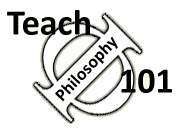Teach Philosophy 101
Free resources for
philosophy teachers!
"One of the most comprehensive, well-researched, and accessible guides for teachers that I have ever seen." James Lang, Chronicle of Higher Education (read full review of TΦ101)
Developmental Differences
Many trees have been destroyed to publish books describing the intellectual development process of students in the traditional college years. For the sake of simplicity, we will summarize the ideas William G. Perry Jr., one of the most important theorists in this area. Perry’s idea is that the way students “make meaning” in their lives changes as students develop and mature. Note that Perry uses terms also familiar to philosophers (such as “dualism” and “relativism”) but that he does not define them as philosophers do. Perry’s schema is often reduced to four main stages of intellectual development:
Note: Student Relativism. Perry does not use the term "relativism" as philosophers do, but many teachers have struggled with what is sometimes called "student relativism." This is the philosophically naive view that all views are equally valid.
Sources:
This discussion is based on Nancy J. Evans, Deanna S. Forney, and Florence Guido-DiBrito, Student Development in College: Theory, Research, and Practice, San Francisco: Jossey-Bass, 1998. This volume also includes summaries of many other development theories including that of Belenky, Clinchy, Goldberger, and Tarule, Women’s Ways of Knowing: The Development of Self, Voice and Mind. New York: Basic Books, 1986.
Michael Cholbi has a different approach to this, classifying students in these categories: resistant leaners; conforming learners (who digest information and return it without processing it); performing learners (who learn diligently but only for external rewards); and intentional learners (who are motivated by a desire for expertise). He presents a theory of how to move philosophy students toward becoming intentional learners: "A Model for Philosophical Pedagogy," Teaching Philosophy. 30:1 (2007) 35-58.
McKeachie, Wilbert J. Teaching Tips: Strategies, Research, and Theory for College and University Teachers. 10th ed. New York:
Houghton Miflin, 1999.
Rhem, James, "Responding to Student Relativism," National Teaching and Learning Forum 15:4, 28 January 2008.
Satris, Stephen, "Student Relativism," Teaching Philosophy 9 (1986): 193-205.
Talbot, Brian, "Student Relativism: How I learned to Stop Worrying and Love the Bomb," Teaching Philosophy 35 (2012): 171-188.
Author: John Immerwahr (with advice from Christopher Schmidt, Department of Education and Human Resources, Villanova University).
Update: 15 Dec. 2015 (E. Tarver); 1-19-2026-D.Sackris
